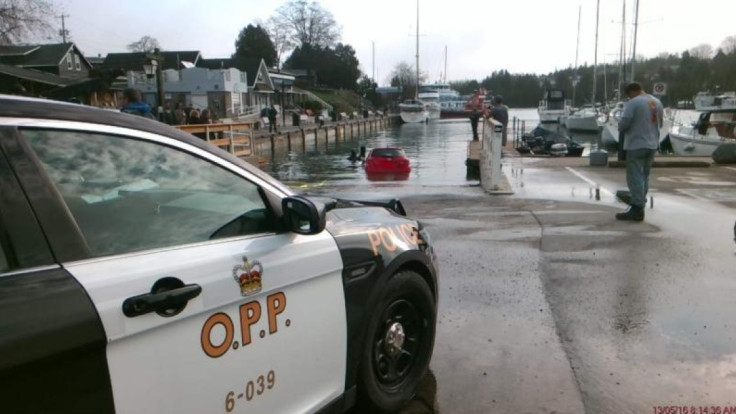Woman blindly follows sat nav and drives car into lake

A woman in Canada following instructions provided by an in-car GPS satnav system ended up driving her car straight into a 100ft-deep lake, but was able to escape unhurt and swim back to shore.
Ontario police say that on Thursday 12 May, a 23-year-old woman was driving in the dark through fog and rain around midnight when she made a wrong turn and ended up going into the Little Tub Harbour in Tobermory, Bruce Peninsula.
She thought she was going down a slope, but was in fact going down a boat launch which sent the car straight into the lake.
"How the launch works, it's not an airborne thing, it kind of goes off the road and then just drops all of a sudden," Constable Katrina Rubinstein-Gilbert of the Ontario Provincial Police told local newspaper Toronto Sun. "So she would have been driving on the road, and then all of a sudden just dropped and hit the water."
Woman escaped without injuries
Miraculously, the car managed to stay afloat long enough for the woman to roll down the car window, grab her purse and swim 30m back to shore, where she then walked to the nearest hotel and called the police.
Meanwhile, her car, a Toyota Yaris, sank completely underwater, prompting the local coastguard to issue an alert warning boats not to approach the harbour in case they accidentally ran into the submerged car.
Although the temperature of the water was only 4C, the woman escaped without any injuries and did not suffer from hypothermia. Police retrieved the car on Friday 13 May but say they are not pressing any charges as the woman was not intoxicated at all.
Although modern technology can be hugely useful, in some cases the use of GPS satnav has caused drivers a great deal of problems.
GPS satnav errors can prove deadly
Some of the incidents reported have been funny, such as the lorry driver whose 50ft lorry got stuck down a narrow Hertfordshire road in the middle of a village; or the Lithuanian lorry driver who was stuck with his lorry in a mud bank down a narrow lane in Lansdown, Bath, and had to stay there for four days in freezing cold weather until police reached a compromise with the haulage company he worked for.
Other incidents have proved that GPS satnav errors can prove deadly, such as in Indiana, US, where a man following a GPS accidentally drove his car 37ft off a demolished bridge in March 2015, killing his wife, who was a passenger. An elderly couple in Brazil were also gunned down in October 2015 when the Waze app instructed them to drive into an infamous crime-ridden favela near Rio de Janeiro.
And in August 2015, a court ruled that a Spanish regional government needed to pay compensation to the family of a man who drowned in a reservoir in 2010 after following GPS satnav instructions, due to the area having very poor route signage.
Interestingly, scientists are now warning that if we don't make use of our spatial memory to learn routes by ourselves and instead rely too heavily on satellite navigation systems, we risk losing our powerful natural sense of direction that our ancestors have relied on for thousands of years, as well as wasting the true potential of our brains.
© Copyright IBTimes 2024. All rights reserved.







